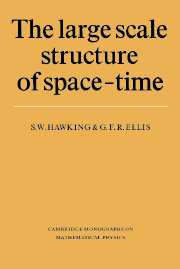Book contents
- Frontmatter
- Contents
- Preface
- 1 The role of gravity
- 2 Differential geometry
- 3 General Relativity
- 4 The physical significance of curvature
- 5 Exact solutions
- 6 Causal structure
- 7 The Cauchy problem in General Relativity
- 8 Space–time singularities
- 9 Gravitational collapse and black holes
- 10 The initial singularity in the universe
- Appendix A Translation of an essay by P. S. Laplace
- Appendix B Spherically symmetric solutions and Birkhoff's theorem
- References
- Notation
- Index
2 - Differential geometry
Published online by Cambridge University Press: 26 January 2010
- Frontmatter
- Contents
- Preface
- 1 The role of gravity
- 2 Differential geometry
- 3 General Relativity
- 4 The physical significance of curvature
- 5 Exact solutions
- 6 Causal structure
- 7 The Cauchy problem in General Relativity
- 8 Space–time singularities
- 9 Gravitational collapse and black holes
- 10 The initial singularity in the universe
- Appendix A Translation of an essay by P. S. Laplace
- Appendix B Spherically symmetric solutions and Birkhoff's theorem
- References
- Notation
- Index
Summary
The space–time structure discussed in the next chapter, and assumed through the rest of this book, is that of a manifold with a Lorentz metric and associated affine connection.
In this chapter, we introduce in §2.1 the concept of a manifold and in §2.2 vectors and tensors, which are the natural geometric objects defined on the manifold. A discussion of maps of manifolds in §2.3 leads to the definitions of the induced maps of tensors, and of sub-manifolds. The derivative of the induced maps defined by a vector field gives the Lie derivative defined in §2.4; another differential operation which depends only on the manifold structure is exterior differentiation, also defined in that section. This operation occurs in the generalized form of Stokes' theorem.
An extra structure, the connection, is introduced in §2.5; this defines the covariant derivative and the curvature tensor. The connection is related to the metric on the manifold in §2.6; the curvature tensor is decomposed into the Weyl tensor and Ricci tensor, which are related to each other by the Bianchi identities.
In the rest of the chapter, a number of other topics in differential geometry are discussed. The induced metric and connection on a hypersurface are discussed in §2.7, and the Gauss–Codacci relations are derived. The volume element defined by the metric is introduced in §2.8, and used to prove Gauss' theorem.
- Type
- Chapter
- Information
- The Large Scale Structure of Space-Time , pp. 10 - 55Publisher: Cambridge University PressPrint publication year: 1973
- 1
- Cited by

